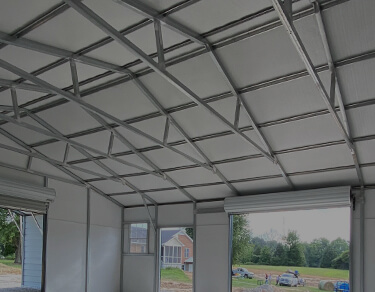
Do Sheds Need a Foundation? A Comprehensive Guide

Building a shed is an exciting project, but one crucial detail often gets overlooked: the foundation. A well-prepared base is essential for ensuring your shed stays stable, level, and protected from moisture, pests, or shifting soil. Without a proper foundation, your shed could face structural instability, water damage, or premature deterioration.
This comprehensive guide will explore why custom metal sheds need foundations, the types available, such as gravel, concrete slabs, and pavers, and how to select the best option based on your shed’s size, purpose, and location. We’ll also share expert tips on installation, cost considerations, and avoiding common pitfalls during construction. Don’t start your project without this essential knowledge to ensure your shed stands the test of time!
Importance Of A Strong Foundation
Numerous factors determine how long your shed will last and how much maintenance it will require. The shed foundation is one contributing component. The foundation is essential to any shed because it determines its longevity. Without the proper foundation, ground moisture could erode the floor of your shed and cause the building to collapse. Therefore, thoroughly knowing the shed bases that are appropriate for the shed you’re creating will help it last.
-
It Stops Your Shed from Becoming A Tilted Mess
Picture this: your shed begins to sink on one side, tilt, and even warp like some kind of shed horror flick. Yikes! If you don’t build a house, a good base protects the construction from soil movement, humidity, and gravity. After some time, the door might not shut correctly, and at worst, the roof might tilt, as in the famous Pisa leaning tower. Not cute.
-
Moisture? No Thanks!
Water is the only competitorto any kind of outside construction. A concrete base or gravel lifts it off the ground to eliminate dampness, mold, mildew, and, eventually, rotten wood. No one would like to keep their favorite tools in a wet and stinking shed, would they?
-
This Is a Long-Term Relationship
Okay, a shed may be nothing more than several hundred square feet of space, but no one wants to get it wrong twice. In this case, you can define a foundation as being similar to the conveyor system of your house or shed. It guarantees that your shed stays with you for years (possibly decades). Without it, you could be in for some major overhauls in the future that would cost you a pretty penny. A little tiny amount in the present saves big worries in the future!
-
It Makes Your Shed Look Sharp
We don’t have to build a shed that seems to have been dropped into the middle of a lawn or grassy area. A foundation provides your shed with a more professional look and feel. Moreover, it makes it flat, meaning you do not have to tussle when falling over bumpy floors or stepping on the water accumulating at the base of the carpet because it is now flat.
-
Keeping up with the Law
In today’s world, there are many regulations and rules to follow depending on the state or country you are located in, and you might be building a foundation for any additional structure, including a shed. So check your local jurisdictions before you commence with the construction, be it zoning regulations, special requirements for the buildings in flood plains, or any other entrenched requirement for a stable construction. Better safe than sorry!
Types Of Foundations For Your Shed: What’s Your Pick?
Having discussed the importance of a foundation, let us look at the available choices. There are various shed foundations, each with its unique twist and advantages. The good news? You’ve got options! Here’s a rundown of the most common ones:
-
Gravel Foundation
It is very user-friendly, cheap, and does not require much professional help; That is why many people go for the gravel foundation. It is possible to make one by digging a small ditch and placing gravel at the bottom; this way, you have perfect ground to avoid moisture. Excellent. It is like a gravel base for your shed but in solid form! It is inexpensive and easy to DIY
-
Concrete Slab
Some of the most reliable and economical foundations are concrete slabs, which are the backbone of the home. No other foundation is as good as this one, though it is also the most complex shed foundation. It has been poured directly to the ground to provide a concrete and flat surface that will not let your shed wobble in any form. It is ideal for use in big sheds, garages, or areas with unsound sub-grades, and most market users recommend it. Super durable and rock-solid, it works in all weathers. One of the best features of the concrete slab is it requires minimal maintenance.
-
Timber Foundation
The most straightforward foundation is the timber base, used with many small sheds. This requires the construction of wooden beams that press against the ground where the shed is to be erected to form a raised floor. It might sound quite feasible if you are looking for a relatively uncomplicated and low-cost project. It is one of the most affordable options and can be installed easily. It supports good air circulation and is a barrier against moisture and/or water. Appropriate for use on flat surfaces, especially where the ground is relatively rigid.
-
Pier and Beam: Built for Bumpy Terrain
Got an uneven or sloped yard? No worries! A pier and beam has a timber floor and open space under it, where concrete or metal piers are sunk into the ground to support your shed. This keeps it off the floor so fresh air can circulate and protect against moisture. It’s ideal for applications where other foundations may fail to maintain their leveling. Perfect for use on those terrains that have slopes or are not leveled. They provide ample air circulation and protection against moisture and external damage.
Conclusion
A solid foundation is more than just a starting point for your prefabricated steel shed—it’s the key to its long-term durability, stability, and functionality. Without a proper base, your shed may face shifting, water damage, and structural weakness, potentially shortening its lifespan. Whether building a garden shed or a large workshop, investing in the proper foundation will save you time, money, and headaches.
Each type of foundation has unique benefits. Gravel is cost-effective and excellent for drainage, concrete slabs provide unmatched stability, and pavers balance aesthetics and functionality. Pier foundations are a reliable choice for sloped or uneven terrain, while timber skids work well for temporary or portable sheds.
Consider your shed’s size, purpose, and site condition to ensure success. A strong foundation sets the stage for a structure that will serve you well for years. With the right approach, your shed will stand tall and weather the elements easily.
delivering & installing
throughout
the united states
Bulldog’s metal barns, garages, and carports are available for delivery and installation in most of the U.S. Whether you’re a homeowner in Maine, a rancher in Texas, or a small business owner in California, you’ll get to-your-door delivery and professional installation, so your building will be sturdy and reliable for years to come.
See Service Area